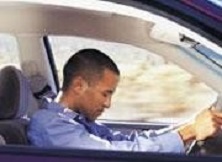|
page 1 of 11
III. Operator Responsibilities
Knowing When Not To Drive
Certain physical or mental situations can make driving unsafe for you, your passengers, and other motorists. Operating a motor vehicle in an impaired state is irresponsible and often illegal. Drugs, fatigue, heightened emotion, or poor vision are all situations in which driving should be avoided.
Personal Concerns
Poor Vision
People who wear contacts, glasses, or other corrective lenses should always be sure to wear them while driving. If you wear anything other than reading glasses, it will most likely state on your driver’s license that you require corrective lenses to drive. If you are pulled over and it is determined that you are not wearing them, there can be serious legal ramifications. Besides, how can you expect to safely operate your car when you can’t even see?
Fatigue/Drowsiness
Fatigue is probably the most common of these physical states. Truck drivers are only permitted to drive for a certain amount of time per day, as driving while tired is a huge impairment of a driver’s awareness. This phenomenon, often called "highway hypnosis", is frequently encountered by motorists who are driving for extended periods of time. You lose your sense of speed and become unconcerned with the dangers where things just seem to be drifting by and you fall asleep.
If you find yourself becoming drowsy while behind the wheel, exit as soon as possible and seek rest. If you are on a stretch of road with no exits, pull over to the side of the road and take a short nap. Your increase in awareness following this nap can be used to find a place to get adequate rest. If ignored, tiredness will lead to short sessions of micro sleep. It is also very easy to fall completely asleep. At this point in time it is impossible for you to maintain control of your vehicle, and the risk of a collision is very high.
 The Motorists who are most at risk for drowsy driving are:
The Motorists who are most at risk for drowsy driving are:
Commercial drivers
Sleep deprived
Shift workers
Driving alone
Taking medicine that increases sleepiness or drinking alcohol
Driving through the night
Driving long distances without taking breaks.
Here are some techniques for preventing fatigue behind the wheel, whether you are a professional driver or take the occasional long trip:
Get adequate sleep before you drive
Try not to drive during your normal sleeping hours
If you feel sleepy, get off the road for a nap
Plan to reach freeway rest areas or overnight accommodation in time for your sleep period
Do not eat a heavy meal before you drive
Avoid medications which can cause drowsiness
Keep the cab temperature reasonably cool, with good circulation of fresh air
If possible, shift your seating position frequently. Stop, get out and do stretching exercises to keep limber and alert
Take breaks every two hours. Get out and walk around in the fresh air for a few minutes.

Anger/Aggression
Aggressive driving usually refers to any display of aggression by a driver. You may be more likely to take out your feelings on other motorists or act rashly in a traffic situation. It is important that you be focused while driving at all times. Failure to do so could result in confrontations or a road rage situation. If you are feeling emotional you are much less likely to be able to focus on driving. "Road rage" is a term believed to be coined by the American media, originally to describe the most violent events. Yet, "road rage", such as using the vehicle as a weapon or physically assaulting a driver or their vehicle, is not aggressive driving. Such acts are criminal offenses, and there are laws to deal with these violent crimes. We will cover "road rage" in detail later in the course.
Stress
This is a condition that everybody experiences as part of daily life. Whether the sources of stress are work-related or due to problems at home or relationship problems, the effects can seriously affect day-to-day life. Symptoms of stress can include the following: muscle tension, sweaty palms, increased heartbeat, dizziness, and uncontrolled patterns of speech or muscle movements. In order to minimize stress, you should carefully plan your day ahead. Don’t catch yourself stuck in traffic, knowing that you could have planned ahead.
Emotional Distress

Managing your stress and emotions to avoid becoming an aggressor is just as important as preventing yourself from becoming a victim. If another driver cuts you off either accidentally or intentionally, take a moment to think before you act rashly. Chances are it was an innocent mistake. Take a moment to count to ten and relax. If the act of the other driver was definitely intentional, it is especially important not to react. You are obviously dealing with someone with an unstable personality. Any aggression you put forth will only combine with the emotions of the other motorist and escalate into a bigger conflict. It is important to place yourself in the seat of the person you are angry at. What would you think of another motorist acting the way you are?
Keeping your emotions in check and knowing how to react in the event of conflict on the roadway are paramount to driving safely.
In order to reduce the chances of having a collision due to stress, fatigue, anxiety, or anger, stick to the following rules:
Don’t drive if upset, ill, tired or angry.
Don’t drive under the influence of alcohol or drugs.
If driving for a long period, pull off to a service area or rest area periodically to stretch or relax.
|








